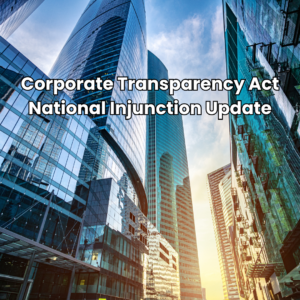Nationwide Injunction Update: Corporate Transparency Act
With the nationwide injunction on the Corporate Transparency Act please read the following article on the what to do with the upcoming filing deadline.
Link to article: https://www.law.com/dailybusinessreview/2024/12/10/nationwide-injunction-halts-corporate-transparency-act-reporting-requirements/
Nationwide Injunction Halts Corporate Transparency Act Reporting Requirements
“There are two options: You file now and avoid worrying about this later, or you wait and see,” said Fabio Giallanza, with Weiss Serota. “But if they reinstate the obligation to file, then, of course, you have to be ready.”
December 10, 2024 at 05:42 PM
The Financial Crimes Enforcement Network, a U.S. Treasury Department bureau, has issued guidance on the newly passed Corporate Transparency Act, stating that reporting certain stakeholder information is now voluntary, pending resolution of the appeal the federal government filed on a recent injunction.
The network, also known as FinCen, gave the update after a judge in the Eastern District of Texas issued an injunction in the case Texas Top Cop Shop, Inc., et al. v. Garland et al, finding that the act is unconstitutional. The update from FinCen comes on the heels of a Dec. 31 deadline to report beneficial owner information for companies formed before Dec. 31, 2023.
The act took effect on Jan. 1. In an effort to promote corporate transparency, the law required corporations and limited liability companies with less than $5 million in revenues and less than 20 employees formed in the United States or authorized to do business in the United States to disclose their beneficial owner information.
According to FinCen, “a beneficial owner is an individual who either directly or indirectly exercises substantial control over the reporting company, or owns or controls at least 25% of the reporting company’s ownership interests.”
Reports under the act were required to be submitted by Dec. 31, but there are new developments because of two court cases.
In the case of Nat’l Small Bus. United v. Yellen filed in the Northern District of Alabama, the court ruled the act is unconstitutional, exceeding the U.S. Constitution’s limits on Congress’ power.
“It was the first case in which a judge issued an injunction basically declaring the likely unconstitutional nature of the Corporate Transparency Act,” said Fabio Giallanza, a corporate and real estate attorney with Weiss Serota and an expert on this matter.
But there is a bigger development which brought a change in the legislation. In Texas Top Cop Shop, Inc., et al. v. Garland et al., a case filed in the Eastern District of Texas, the court issued a preliminary injunction against the enforcement of the Corporate Transparency Act and its implementing regulations.
“This case in Texas goes a step further, and a big step further, because you made the injunction, which is not limited to the plaintiffs in the case, but it’s a nationwide injunction,” said Giallanza.
Judge Amos L. Mazzant in the Eastern District of Texas argued in his opinion that the law is likely unconstitutional. According to the opinion, the government was unable to provide the court with any tenable theory that the act falls within Congress’s power.
“First, it represents a federal attempt to monitor companies created under state law—a matter our federalist system has left almost exclusively to the several states,” Mazzant wrote. “Second, the (act) ends a feature of corporate formations designed by various states—anonymity.”
After the injunction was filed, FinCen shared the following statement: “In light of a recent federal court order, reporting companies are not currently required to file beneficial ownership information with FinCEN and are not subject to liability if they fail to do so while the order remains in force. However, reporting companies may continue to voluntarily submit beneficial ownership information reports.”
“I suspect this is a highly relevant piece of legislation,” Giallanza said. He said there are other cases pending in different federal courts of appeal and there’s a chance that the U.S. Supreme Court may get involved at some point.
“Now, there are two options: You file now and avoid worrying about this later, or you wait and see,” he said. “But if they reinstate the obligation to file, then, of course, you have to be ready. We don’t know how much time we’ll have if that happens, and you don’t want to be caught by surprise if the law is reinstated.”



